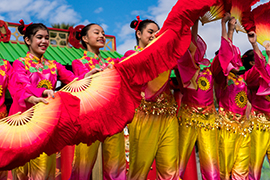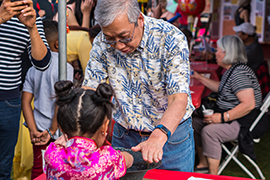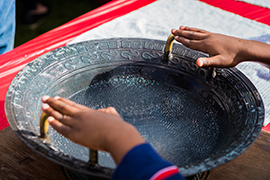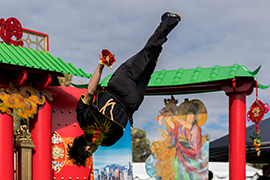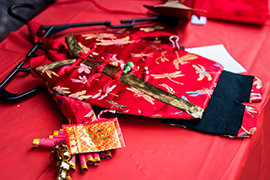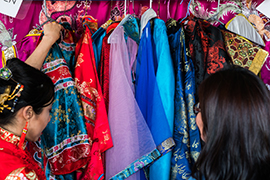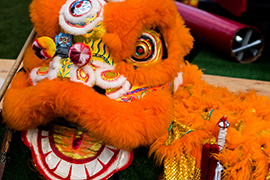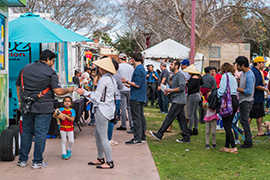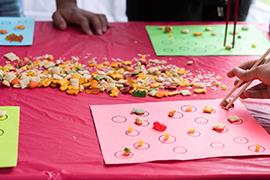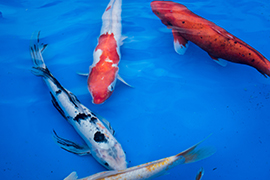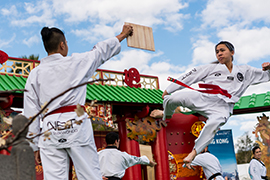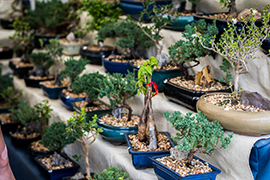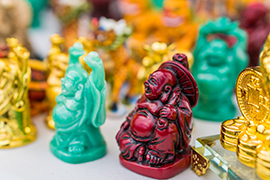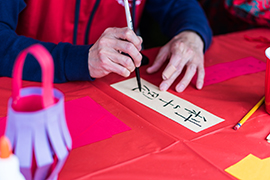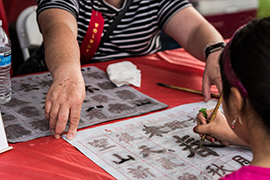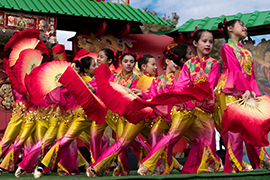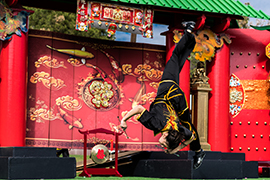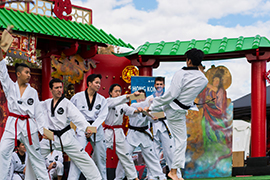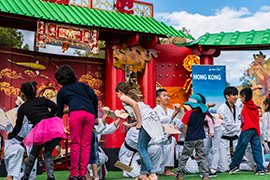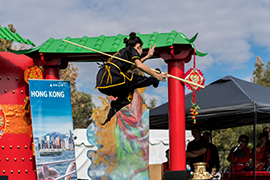- Slug: BC-CNS-Chinese Fest,320
- Photos available (thumbnails, captions below)
By ANDREA ESTRADA
Cronkite News
PHOENIX – For two days, Margaret T. Hance Park became the epicenter of Chinese culture and traditions, as the 28th annual Chinese Cultural and Cuisine Festival took over the public space in February, offering Valley locals an opportunity to see, hear and taste what the Asian country has to offer.
Jeffrey Chow, a resident of Gilbert, and his wife brought their two young children to the festival. They said they came to enjoy the food and activities, but more than that, they came to expose their kids to their culture.
“We wanted to make sure our children kind of understood about what the whole celebration was about and to get them to understand their roots,” Chow said.
Martial arts performers took to an outdoor stage to present their own bit of Chinese culture in the form of juggling fire spears and precisely slicing thin paper with just the flick of a whip.
Chow said the performance, yet another display of Chinese culture, was among the several reasons for bringing his children to the festival.
Apart from the performances, the opportunity to taste traditional Chinese foods was another attractive factor to festival goers.
“The first thing that we were looking for was Chinese food because that’s my heritage,” said Ray Chin, an Arizona resident of Chinese descent.
Long lines of attendees wrapped around various food trucks offering bites of home and comfort.
Ana Heinbach, owner of Steamed Buns, said what makes the food at this festival different is that it is not commercialized nor Americanized.
“When you go to a festival like this, there are more original Chinese foods. The way our grandparents used to make,” she added.
She said she remembered how her grandparents made steamed buns by hand – a process she now carries into her own business.
This year, the festival also celebrated the Chinese New Year, marking 2018 as the year of the dog.
For more stories from Cronkite News, visit cronkitenews.azpbs.org.
^__=
Click on thumbnails for full-size photo:
Students of Phoenix Wushu Academy perform a fan dance at the 28th annual Chinese Cultural and Cuisine Festival in Phoenix, telling stories and expressing emotion using fans to highlight their graceful movements. (Photo by Daria Kadovik/Cronkite News)
Volunteer York Lew shows how to make the water in the bowl “dance” by rubbing the handles and creating sonic vibrations. (Photo by Daria Kadovik/Cronkite News)
The water in the bowl dances due to sonic vibrations created by rubbing the handles. Volunteer York Lew said bigger hands create bigger vibrations. (Photo by Daria Kadovik/Cronkite News)
A student from Phoenix Wushu Academy performs an aerial maneuver during a Wushu performance. Wushu is a martial art that includes aerials, butterfly twists, jump kicks all several feet above the ground, according to Phoenix Wushu Academy. (Photo by Daria Kadovik/Cronkite News)
The photo booth at the Chinese Culture and Cuisine Festival offered handmade costumes for dogs to take pictures in. (Photo by Daria Kadovik/Cronkite News)
Volunteer Amy Oho, left, shows Chinese imperial costumes that present a colorful showcase of the culture. (Photo by Daria Kadovik/Cronkite News)
The legend of the lion dance tells of a monk who dreamed of evils invading the land, and prayed for protection to the gods, who said a lion would protect them. Not knowing what a lion looked like, the people combined all the lucky and magical animals into one, creating their own lion to scare away evil spirits. (Photo by Daria Kadovik/Cronkite News)
Many people gathered at Margaret T. Hance Park in Phoenix to celebrate the Year of the Dog by experiencing vibrant examples of Chinese culture. (Photo by Daria Kadovik/Cronkite News)
Visitors practiced their chopstick skills at the culture booth at the festival. Dropping food while using chopsticks is considered disrespectful in Chinese culture. (Photo by Daria Kadovik/Cronkite News)
Valley of the Sun Koi Club had multiple pools filled with colorful koi fish, a symbol of wealth and prosperity in Chinese culture. (Photo by Daria Kadovik/Cronkite News)
NB Taekwondo students showed their skills in Korean martial art taekwondo, a martial art with emphasis on head-height kicks. (Photo by Daria Kadovik/Cronkite News)
Lily’s Bonsai and Gifts offered visitors the opportunity to purchase their own bonsai tree. (Photo by Daria Kadovik/Cronkite News)
Many vendors at the Phoenix Chinese Week’s Culture and Cuisine Festival offered traditional souvenirs such as Laughing Buddha called Budai.(Photo by Daria Kadovik/Cronkite News)
The volunteers at the cultural booth at Phoenix Chinese Week’s Culture and Cuisine Festival offered visitors the chance to have their names written in Chinese. (Photo by Daria Kadovik/Cronkite News)
With 7,000 different characters in Chinese writing, knowing the 12 basic strokes to write them is important. A volunteer shows a child how to write a character that means “spring” in standard Chinese. (Photo by Daria Kadovik/Cronkite News)
Phoenix Wushu Academy performed a traditional fan dance, which has been part of China’s heritage for more than 2,000 years. (Photo by Daria Kadovik/Cronkite News)
A performer from Phoenix Wushu Academy in the middle of an aerial, a common challenging element in wushu, an ancient form of Chinese martial art. (Photo by Daria Kadovik/Cronkite News)
A student from NB Taekwondo breaks multiple wooden boards in a row to show power and accuracy. (Photo by Daria Kadovik/Cronkite News)
NB Taekwondo invited volunteers to break wooden boards, a common technique in martial arts. (Photo by Daria Kadovik/Cronkite News)
Wushu, a Chinese martial art, has various styles, from barehand to styles with short or long weapons. (Photo by Daria Kadovik/Cronkite News)
